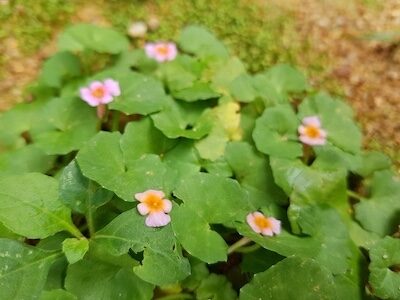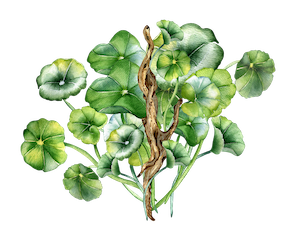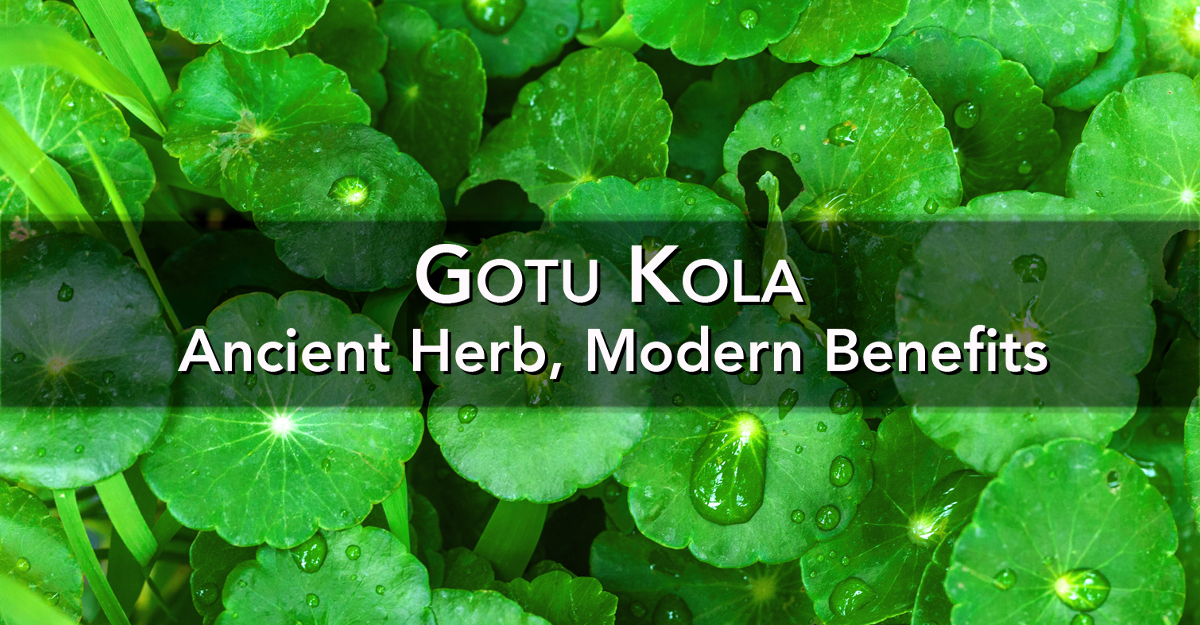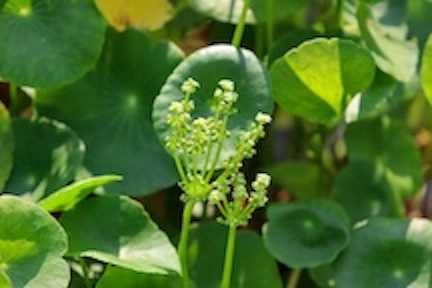Gotu Kola, Ancient Herb, Modern Benefits
by Mark J Kaylor
Gotu Kola (Centella asiatica), a small, perennial herb native to Asia, has been revered in traditional medicine for centuries. Known by various names, such as Brahmi in India and "the herb of longevity" in traditional Chinese medicine, Gotu kola has been used for its numerous health benefits, particularly its potential to enhance cognitive function and support brain health.
Botanical Background
 Gotu Kola belongs to the Apiaceae family, the same family as parsley and carrots. It thrives in tropical and subtropical regions, especially in Southeast Asia, where it grows in moist, shady environments. The plant features small, fan-shaped leaves and delicate white or pink flowers. It's the leaves of Gotu kola that are primarily used for medicinal purposes.
Gotu Kola belongs to the Apiaceae family, the same family as parsley and carrots. It thrives in tropical and subtropical regions, especially in Southeast Asia, where it grows in moist, shady environments. The plant features small, fan-shaped leaves and delicate white or pink flowers. It's the leaves of Gotu kola that are primarily used for medicinal purposes.
Traditional Uses
Gotu kola has been a cornerstone in Ayurvedic, traditional Chinese, and Indonesian medicine for thousands of years. It has been traditionally used to:
- Enhance Cognitive Function: In Ayurveda, Gotu kola is classified as a "Medhya Rasayana," a category of herbs that rejuvenate the mind and improve cognitive abilities. It has been used to improve memory, focus, and overall mental clarity.
- Promote Wound Healing: Gotu kola has long been applied topically to treat minor wounds, burns, and skin conditions. Its active compounds are believed to promote collagen production, essential for skin regeneration.
- Reduce Anxiety and Stress: Gotu kola is also known for its adaptogenic properties, helping the body resist stress and promoting relaxation. It has been used to alleviate symptoms of anxiety and improve sleep quality.
- Support Circulation: Traditional medicine has utilized Gotu kola to improve blood circulation, particularly in the legs, which is beneficial for conditions like varicose veins and chronic venous insufficiency.
Modern Research on Gotu Kola and Brain Health
 In recent years, scientific interest in Gotu kola has surged, particularly regarding its effects on brain health. Here's a summary of the latest research:
In recent years, scientific interest in Gotu kola has surged, particularly regarding its effects on brain health. Here's a summary of the latest research:
- Neuroprotective Properties: Studies have shown that Gotu kola contains a variety of active compounds, including triterpenoids (such as asiaticoside, madecassoside, and asiatic acid), that possess neuroprotective properties. These compounds can protect neurons from oxidative stress and neurotoxicity, which are implicated in neurodegenerative diseases like Alzheimer's disease (AD) and Parkinson's disease (PD).
- Cognitive Enhancement: Animal studies have demonstrated that Gotu kola extracts can enhance cognitive function, particularly in areas related to memory and learning. One study published in Neuroscience Letters showed that Gotu kola supplementation improved spatial memory in rats, suggesting potential benefits for learning and memory enhancement in humans.
- Anxiety and Mood Disorders: Gotu kola's anxiolytic effects have been supported by several studies. A randomized, double-blind, placebo-controlled study found that Gotu kola significantly reduced anxiety in participants who experienced chronic anxiety. The herb is thought to modulate the neurotransmitter gamma-aminobutyric acid (GABA), which plays a key role in regulating mood and anxiety.
- Stroke Recovery: Emerging research suggests that Gotu kola may aid in the recovery of brain function following a stroke. A study published in the Journal of Ethnopharmacology found that Gotu Kola extracts helped improve cognitive function in post-stroke patients, possibly by enhancing antioxidant defenses and reducing inflammation in the brain.
- Alzheimer's Disease: Gotu kola's potential role in the management of Alzheimer's disease has garnered attention due to its antioxidant and anti-inflammatory effects. Some studies have suggested that Gotu kola may inhibit the formation of beta-amyloid plaques, which are characteristic of Alzheimer's disease. While research is still in its early stages, these findings are promising for the future development of Gotu kola-based treatments for neurodegenerative conditions.
How to Use Gotu Kola
Gotu kola is available in various forms, including dried leaves, powders, capsules, and tinctures. Traditionally, it is consumed as a tea or infusion. In modern applications, standardized extracts are often used to ensure consistent dosing of active compounds.
Typical dosages vary depending on the form and the purpose of use, but common recommendations include:
- Tea or Infusion: 1-2 teaspoons of dried Gotu kola leaves steeped in hot water for 5-10 minutes, consumed 1-2 times daily.
- Capsules or Tablets: 300-500 mg of standardized Gotu kola extract taken 1-2 times daily.
- Tincture: 30-60 drops taken 1-3 times daily.
It's important to consult with a healthcare provider before starting Gotu kola, especially if you are pregnant, breastfeeding, or taking other medications.
Gotu Kola, Ancient Herb, Modern Benefits
Gotu kola is a remarkable herb with a rich history of use in traditional medicine. Modern research is beginning to validate its traditional claims, particularly regarding brain health and cognitive function. As studies continue to explore its full potential, Gotu kola may emerge as a valuable natural remedy for supporting mental clarity, reducing anxiety, and protecting the brain from age-related decline.
References
- Orhan, I. E., & Senturk, M. (2012). Centella asiatica (L.) Urban: From traditional medicine to modern medicine with neuroprotective potential. Journal of Ethnopharmacology, 143(2), 354-365.
- Kumar, M. H. V., & Gupta, Y. K. (2002). Antioxidant property of Centella asiatica in healthy volunteers following oral administration. Indian Journal of Physiology and Pharmacology, 46(2), 180-184.
- Bradwejn, J., Zhou, Y., Koszycki, D., & Shlik, J. (2000). A double-blind, placebo-controlled study on the effects of Gotu Kola (Centella asiatica) on mood disorders and anxiety. Journal of Clinical Psychopharmacology, 20(6), 680-684.
- Rao, S. B., & Rao, B. S. S. (2006). Centella asiatica enhances learning ability in mice. Journal of Ethnopharmacology, 104(3), 344-349.
- Gray, N. E., & Harris, C. J. (2016). Centella asiatica attenuates amyloid-β-induced oxidative stress and mitochondrial dysfunction. Journal of Alzheimer’s Disease, 54(1), 227-239.
Mark J. Kaylor is a passionate advocate for holistic health and natural remedies, with a focus on extending both lifespan and healthspan. As the founder of the Radiant Health Project and host of Radiant Health Podcast, Mark blends in-depth research with traditional wisdom to empower others on their journey to vibrant health. Through his writing and speaking, he shares insights into the transformative power of herbs, nutrition, and lifestyle practices.
Disclaimer: All information and results stated here is for educational and entertainment purposes only. The information mentioned here is not specific medical advice for any individual and is not intended to be used for self-diagnosis or treatment. This content should not substitute medical advice from a health professional. Always consult your health practitioner regarding any health or medical conditions.






